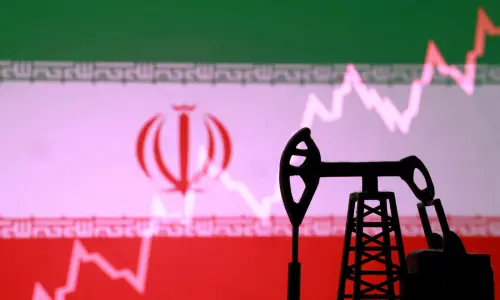SOME 15 years ago, I came across an elderly German couple who were on their way to visit the Swat valley. They both were teachers and had taught at Bhawalpur's Sadiq Public School for quite some time. After an introduction and exchange of pleasantries, the gentleman asked me about Pakistani society and Urdu. His first few questions included “Is ghazal the only genre in Urdu poetry?” “Not at all!” I exclaimed.
We may forgive him since he did not know much about our language and literature. But what to say of those who believe that Urdu literature does not have much to offer beyond poetry, particularly love poetry.
In his book 'Urdu mein sciencey adab' (1969), Khwaja Hameeduddin Shahid wrote that the Salar Jang Library in Hyderabad Deccan had a rare manuscript of a 16th century masnavi (a long poem) named 'Bhog bil' (luxurious living). Written by Shahabuddin Qureshi (1504-1543), a poet from Deccan, the manuscript includes some medical prescriptions as well. These prescriptions were versified and one of them described a remedy for eye infection. Though today's medical experts may dismiss the prescription as unscientific or dangerous, or both, and we may laugh at the sheer idea of writing a medical prescription in verse, we should remember that this is, perhaps, the earliest scientific writing in Urdu and shows that Urdu was quite capable of expressing, even in its early phases, what one had to say about technical and scientific issues.
'Raag Bilawal', the oldest Urdu manuscript on music found so far, was written in 1591. Another manuscript on music 'Mufarreh-ul-quloob' (something that delights the hearts), obtained from Tipu Sultan's library and preserved in India Office Library, was written in 1783. An Urdu manuscript 'Mualajaat-i-Khwaja Bandanawaz' (the remedies of Khwaja Bandanawaz) dates to 1681. And Urdu manuscripts on religious subjects are innumerable and date to even earlier times. What these manuscripts amply prove is that the writers of Urdu were aware centuries ago that no language can truly be called a developed and progressive one unless it has books on a variety of subjects. In later eras, the number of Urdu books on scientific subjects remarkably increased and disciplines such as astrology, algebra, midwifery, surgery, diagnostics, paediatrics, zoology, pharmacology, chemistry and engineering were discussed by writers of the books, many of which were published and many other writings are still lying in the dusty shelves of our libraries and museums in the shape of manuscripts.
Delhi College, Aligarh's Scientific Society, Rurki College of Engineering and Hyderabad Deccan's Usmania University were among the institutions which got Urdu books on scientific disciplines written and published. After independence, many institutions began translating or publishing technical books in Pakistan. Karachi University's Bureau of Compilation and Translation and Muqtadira Qaumi Zaban merit a special mention for rendering thousands of technical and scientific terms into Urdu. One can only regret that despite a large number of books written in Urdu on science and technology in the 18th, 19th and 20th centuries and incessant efforts by institutions and individuals, the misconception that the Urdu language is suitable only for literary writings persists.
Among the individuals who have worked hard to dispel this notion by writing books in Urdu on medical science is Dr Aslam Syed. A family physician and a heart specialist, he has been writing on health issues for over four decades now. He stands head and shoulder above the rest in the use of the language. What distinguishes him from others is that he rarely uses an English word in his Urdu writings. His lovely, flowing and chaste Urdu makes one realise that Urdu is quite capable of expressing any thought with only rarely falling back on English for technical vocabulary.
Dr Syed has brought hundreds of technical words back to life by using them in his books. He has coined many beautiful Urdu equivalents for medical terminology. Most of his books contain either index (a rarity with Urdu books) or glossary that explains medical terms in Urdu. Some of them are 'hissiyet' (allergy), 'hamla-i-qalb' (heart attack), 'buland fishaar-i-khoon' (high blood pressure), 'afoonat' (infection), 'jarrahi-i-mashaatgi' (cosmetic surgery), 'hawa paash' (aerosol) and 'tosi-i-rag-i-dil' (angioplasty) etc.
His early education that he received at mosques and madressas and, a little later, at Aligarh Muslim University created in him a deep sense of belonging. Later, his training at Royal College of Physicians, Edinburgh, gave him a scientific and modern approach. As is evident from his books, these two apparently contradictory traits are beautifully entwined in his personality. His books, dotted with exquisite Urdu and Persian couplets and peppered with anecdotes, make a good reading, in addition to informing and advising the reader on health issues.
Being a cardiologist, he in his recent books, 'Ehtiyaat', 'Sheeraza-i-dil', 'Tandurusti' and 'Ghiza sab ke liye', gives some really important information on health, especially the heart, and tips on how to make it work longer for you.
Published by Sir Syed University of Engineering and Technology, Karachi, these books are a pleasant reminder that Urdu is a perfect medium for expressing your scientific views — as it has always been. Those who believe that Urdu is fit for ghazals alone must read Dr Aslam Syed's books.
—drraufparekh@yahoo.com




























